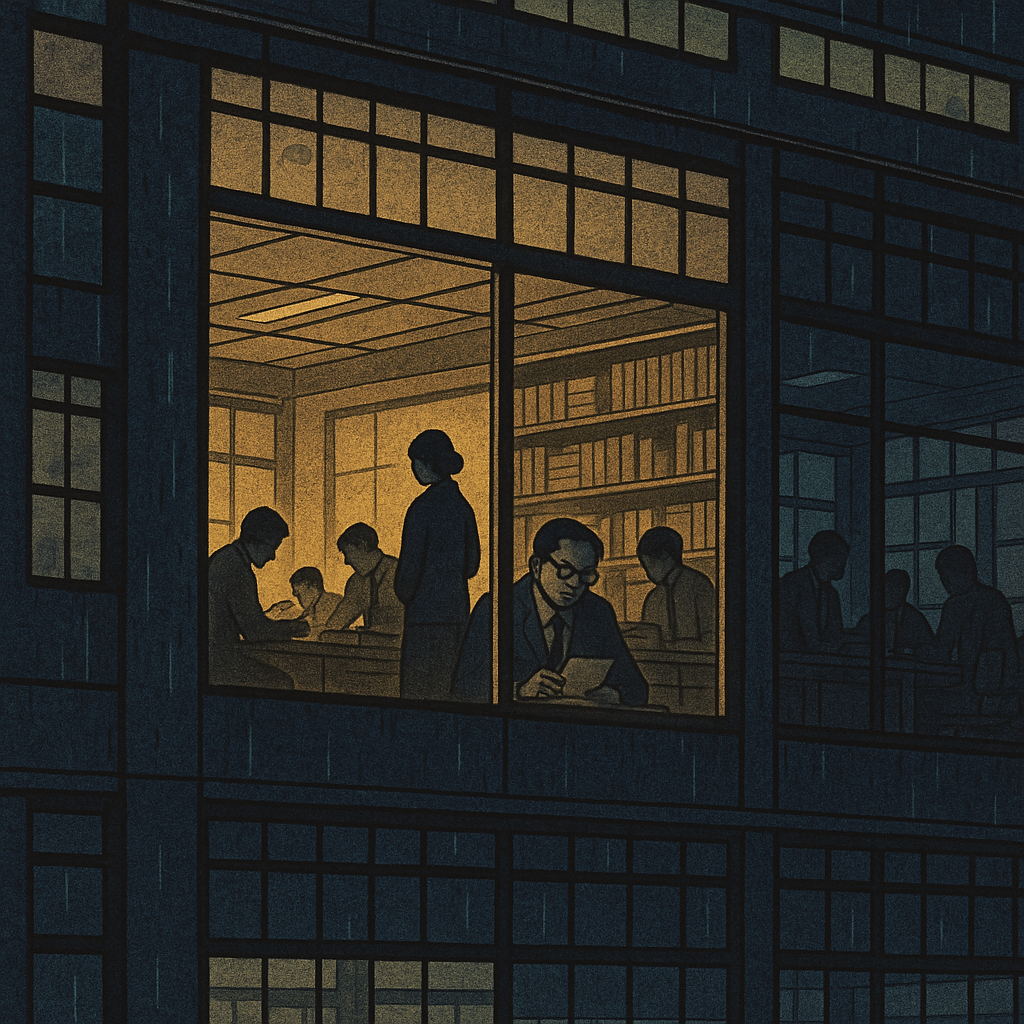The other day, @azircon asked me about the dark side of Japan’s work culture. Most of the time, I don’t like focusing on the negative, but there is a lot here, as anyone who has read anything past the surface of Japanese culture can tell you. So let’s dive in. I’ll try to be even-handed here and give some balance, but this will be largely on the negative side.
Japan’s postwar miracle was built on devotion. Long hours, total loyalty, and group cohesion were celebrated as virtues. That generation rebuilt a nation. But their descendants inherited not just the prosperity, but also the pressure that came with it.

Let’s just step through some of these pressures, starting with perhaps the most pervasive one.
The Culture of Staying Late
In many Japanese companies, no one wants to leave before their boss. The result is an unspoken rule: you stay until the last manager leaves. It’s not written anywhere, but everyone knows it. You might finish your actual work by 6 p.m., but you’ll sit there pretending to type until 9 because going home early means you “lack commitment.” You’ll find Japanese salarymen are masters of pretending to be busy when they aren’t. It’s a survival technique in Japan.
There’s a word for this: サービス残業 (sābisu zangyō) — “service overtime”. It’s unpaid, but expected. People joke about it, but quietly resent it. It’s one of those jokes that isn’t funny.
The Early Bird and the Dead Bird
On the other side of that same coin is the morning race. Arriving early is seen as a sign of diligence, even when it serves no purpose. The trains fill with salarymen half-asleep, neckties askew, clutching convenience-store coffee as they shuffle toward their desks an hour before the day starts.
The irony is brutal: being early and staying late cancels out sleep, family time, and health — but not the performance review. Promotions rarely come from efficiency; they come from presence.
As you might imagine, this leads to a corporate culture where the people who are promoted are the best at playing the game, not the most competent workers. Of course this happens in the West too, as everyone knows, but Japan takes it to an entirely different level.
The Nomikai Trap
Then there are the drinking parties, 飲み会 (nomikai). On paper they sound good. Free booze and the chance to mingle with the boss outside the strict politeness culture. And yeah, they can be that. Sometimes.
They are nominally “optional”, but… not really. A junior who skips too many risks being labeled unfriendly or insincere and might give up any chance of ever being promoted. These nights can blur the line between bonding and obligation.
At their best, they break hierarchy for an evening and let everyone relax. At their worst, they’re a kind of soft coercion: stay late, drink hard, laugh at the manager’s jokes, and then wake up to do it all again. Combine this with the two points above, and it’s not much of an exaggeration to say that some salarymen only see their families on weekends — if that.
The Middle Manager Problem
The postwar company system created a stable but stagnant hierarchy. Many of today’s middle managers are survivors of that system. These are men who rose by endurance, not innovation. They became experts in meetings, not in management. Their job is often to “coördinate”, meaning to ensure no one takes risks that could disturb harmony.
Japan still produces brilliant engineers and designers, but their ideas often suffocate under layers of approval stamps and red tape.
The 1980s powerhouse companies — Sony, Toshiba, Sharp, etc — these Japanese companies so dominated the global landscape that the US worried about Japanese hostile takeovers of all key companies and there were actually books published warning of a future war with Japan based on this “economic terrorism”.
These companies were victims of their own bureaucracies and that did them in. Of these powerhouses, only Sony remains, and it’s a shell of its former self — kept alive largely by the unexpected success of the PlayStation.
The Cost of Harmony
All of this ties back to 和 (wa), “harmony”. It’s a beautiful concept, but in the office it often means don’t stand out. Don’t challenge the boss. Don’t leave early. Don’t skip the party. Just fit in.
For decades, that worked. It made Japan a symbol of collective excellence. But as the global economy shifted toward speed, creativity, and flexibility, Japan’s rigid hierarchies became liabilities. Harmony turned into hesitation. Dedication turned into burnout.
A Quiet Change
So, yeah. That’s the bad.There’s room for nuance, and I could list more, but that gives you the general picture.
There are companies trying to change. Startups, foreign-owned firms, and even a few traditional giants are experimenting with remote work, flexible hours, and merit-based promotion. But cultural inertia runs deep. Until “going home on time” stops being seen as selfish, real reform will be slow.
Still, I’ve met countless Japanese workers who dream of balance, who want to be productive and present at home. Change in Japan is like the seasons: slow, but inevitable.

Have you ever experienced this kind of silent pressure—where “optional” doesn’t really mean optional? I’d love to hear your thoughts.
❦
 |
David is an American teacher and translator lost in Japan, trying to capture the beauty of this country one photo at a time and searching for the perfect haiku. He blogs here and at laspina.org. Write him on Bluesky. |